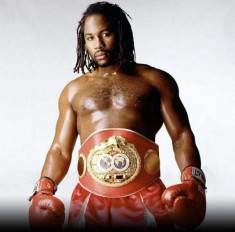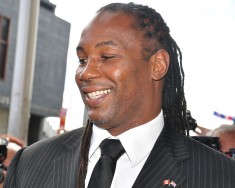| Lennox Lewis | |
|---|---|
 |
|
| Boxer | |
| Born | Sep. 2, 1965 West Ham, London, England |
| Nationality | English-Canadian |
Lennox Lewis was born to Jamaican parents in 1965 in West Ham, London. Later they moved to Kitchener, Ontario, Canada. Lennox had a troubled childhood which led him to following his mother to Canada in 1977 at the age of twelve.
Beginning a Boxing Career
In Canada, Lennox enrolled in the Cameron Heights Collegiate Institute for his High school studies. It was during this time that he exhibited exemplary sportsmanship by excelling in Canadian football, basketball, and soccer.
After taking part in different sports, he eventually decided to take up boxing as his favorite sport where he excelled while fighting as an amateur boxer. He began making a name for himself in the sport of boxing in 1983 when he won the world amateur junior title.
At the young age of 18, Lewis represented his country at the Summer Olympics in Los Angeles in 1984. He was not impressed by his performance so he opted to remain an amateur for some time to improve and win a medal. His loss at the 1986 Amateur Boxing Championships at the preliminary round did nothing to discourage him.
After the championships, he went on to win a number of titles. He finally achieved his dream in the 1988 summer Olympics in Seoul, South Korea. After his debut there, Lennox decided to become a professional boxer.
Becoming a Professional Boxer
After winning his first gold medal and the disappointing reception back in Canada, Lennox moved back to England where he signed up with Frank Maloney as his boxing promoter. In 1990, Lennox won the European heavyweight title after defeating Jean Maurice Chanet. His career steadily progressed with key defeats of boxing greats like Gary Mason and Derek Williams to take the British title and the Commonwealth title respectively.
Major Boxing Achievements
Lennox’s steady rise in boxing was strongly felt in October of 1992 when he knocked out Donovan Ruddock of Canada in just two rounds. This win was very important as it made Lennox the number one contender in the World Boxing Council rankings.
This was certainly one of his best achievements in his boxing career because it eventually put him against Riddick Bowe for the number one contender. In 1992, Lennox was declared the WBC champion after Riddick refused to face him. Lennox continued with his impressive performance, defending his title three times against the world’s best in the ring.
Major Upset
In 1994, Lennox lost his title to Oliver McCall in a technical knockout. After the loss, Lennox replaced his trainer and cited severed relations as the reason. He later picked Emanuel Steward who also happened to be McCall’s trainer during his title loss. This marked a major and important decision on Lennox’s career as Steward engaged him in a signature and unique style through his career until his retirement.
Fighting Back
After the loss to McCall, Lennox embarked on a journey for a comeback. He easily won the mandatory challenger position which put him against American boxer Lionel Butler. Lennox successfully fought through a series of other fights with Justin Fortune, Tommy Morrison, and Ray Mercer.
A Successful Comeback
 Lennox was set for a rematch with McCall in February of 1997 where he successfully recaptured the WBC title when McCall refused to continue fighting after losing the first three rounds. Lennox continued to defend the WBC title through the years.
Lennox was set for a rematch with McCall in February of 1997 where he successfully recaptured the WBC title when McCall refused to continue fighting after losing the first three rounds. Lennox continued to defend the WBC title through the years.
In March 1999, Lewis faced Evander Holyfield in a match many people had looked forward to. The fight was marred with a lot of controversy leading to a rematch. Lennox won the match to become the world’s undisputed champion and thereafter continued to reign supreme by defending the WBC, IBF and IBO title against possible contenders.
Later Years
Lewis’s years before retirement set him against Mike Tyson and Vitali Klitschko. Many boxing enthusiasts eagerly waited for the fight against Tyson. Lennox, however, dominated the fight using his superior skills and his height advantage to deliver a knockout to Tyson.
Retirement
In February of 2004, Lewis announced his retirement from the ring to pursue other interests. At the time of his retirement, he had a record 41 wins, two losses, and one draw under his belt. This achievement has made him of the most popular people in the history of boxing.